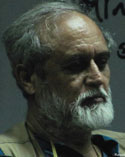
By Muhammad Nurul Huda
12 November 2015
THE killing of two foreign nationals, the gruesome death and wounding of progressive publishers and the deadly attacks on law enforcers resulting in two deaths may have given rise to a fear psychosis. Concerned scribes have implored the authorities not to engage in rhetoric and blame games and impressed upon the imperative of tasking the law enforcers to apprehend the criminals and their mastermind, and bring them to justice.
A senior law enforcement officer has said that they do not as yet have an appropriate counter-terrorism outfit to effectively combat the recent depredations. Some observers see the re-growth of a political ideology arising from manipulation of religion. Accusations have also been made about the suspected alliance of some political elements that have facilitated the clandestine growth of the so-called religious extremists. Reportedly, such developments were often overlooked or tolerated for short-term political goals. The rise of militant Islam globally accompanied by an ideology of nihilism is suspected to have given impetus to the home-grown obscurantist elements to cause the mischief.
Under the circumstances, while the law enforcement agencies need to be made accountable, it is equally important to look into the policy and attendant strategy dimension of countering the so-called religious extremism. This is essential for countervailing measures which would inevitably bring to the fore the issue of real threat perception. In specific terms, do we have a broad political agreement about the threat posed to our polity by the so-called religious extremists? Or is the current resolve, howsoever inadequate that may be, only regime-centric?
In tasking the law enforcers, whether in fighting or controlling or even containing the so-called religious extremism, the first step is to understand and appreciate the very prevalence of such elements in a given society and their pernicious effects on the way of life of the citizens. Unfortunately, in Bangladesh, we have been slow in appreciating the realities on the ground. This is not to discredit anybody or apportion blame to any particular political party because the growth and muscle flexing of the obscurantist elements has not been limited to the tenure of one regime. Cumulative inaction of the regulatory authority resulting from a lack of appreciation by policy-makers about the mindset and modus-operandi of the extremists may have brought us to the present state of affairs.
We need to be clear and definite about the threat perception. This is crucial because one cannot possibly treat a disease by denying its very existence. So from vague generalities if one has to venture into meaningful specifics, one cannot but make a pointed reference to our constitution.
The constitutional position as against the scheme and designs of the extremists leaves no room for any ambiguity. While at the macro-level it may be a matter of political direction to sort out disagreements through dialogue and persuasion, the field-level operatives, both in uniform and plainclothes, must have clear directives and a plan of action for preventing violent subversive actions. This is all the more significant now because the new enemy has an emotional and religiously sensitive alignment with the common folk of the country. One must not be oblivious of the fact that the enemy combatants are entrenched in places and institutions that are traditionally respected and revered in our society.
As part of strategy, the enforcement apparatus should succeed in separating an act of violence from its so-called politico-social context and thus criminalise a certain mode of political expression. In Bangladesh's context, this line of action would be very appropriate because there is a greater need to reject the religious extremists' right to legitimise violence as part of a larger social movement.
The so-called Jihadists must not be bracketed with political dissenters, although such differentiation becomes difficult from an enforcement point of view. Procedures for dealing with religious extremists should be such as to distinguish them from constitutionally oriented political elements.
The above has been emphasised upon because the mission and strategy of our crime-fighting and intelligence organisations had not been stable, at least insofar as the so-called religious extremist threat scenario is concerned. Those have changed with the change of a regime. It has been our unfortunate experience to witness the differing political agendas often clouding the pragmatic understanding of our real national interests.
There must not be any hesitation in the battle against the frontal attack on our constitution. There must not be any ambivalence in relentlessly pursuing the bigoted mischief-makers. Religious institutions or places of prayer should not be allowed to be used as sanctuaries. Quite a number of such entities may have to be subjected to well-planned discreet surveillance.
Voluntary or charitable work or even religious teachings which are suspected to be used as cover by some organisations should be shadowed so that genuine welfare work can be separated from malafide subversive ventures.
Foreign donations either by individuals or organisations must pass through government scrutiny. This must be made mandatory. Along with this there must be a complete account of suspected educational institutions and the areas of instruction should be known to competent authorities.
Democracy has to allow the interaction of different shades of opinion or divergent views to ensure the vibrancy of a pluralist society. However, that does not mean that there will be freedom to convert the entire country into a theocratic dispensation by application of force and intimidation. There is a challenge to our way of life. This must be realised by the mainstream political parties who are pledge-bound to uphold, protect and preserve our constitution. Therefore, the visible enemy must be caught by the forelock and be dealt with under the law. A sovereign Republic born out of a historic struggle entailing epic human sacrifices demand that. We must not fail.
Muhammad Nurul Huda is a columnist of The Daily Star.
Source: hedailystar.net/op-ed/politics/tasking-the-law-enforcers-171001




 Moderate Islamist here
Moderate Islamist here


0 comments:
Post a Comment